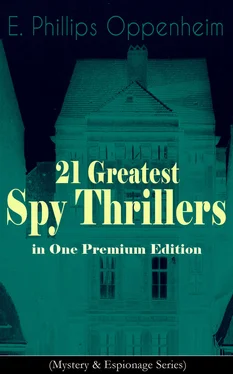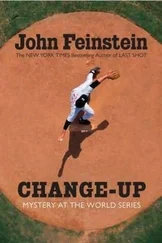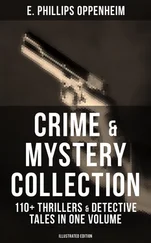“Starvation,” he observed, “agrees with you.”
“Thank you,” she answered. “I don’t want to try it again.”
“I’ll see that you don’t!”
It was too much. The tears were in her eyes.
“I shall have several small attacks like this,” she warned him with a little choke. “Don’t take any notice of them, please.”
“I was just thinking,” he remarked, “that I should like to kiss that one away.”
“You can do just as you like,” she said, moving her handkerchief from her eyes and looking at him.
There was no doubt whatever about his inclinations or the exquisite touch of her arms around his neck. There was no doubt at all, either, about the sincerity of his imprecation at the sound of that stiff official knocking at the door. He drew quickly away.
“Come in!”
Joseph, the world-famed concierge of one of the most famous hotels in Europe, entered the room cap in hand. He was a large, rotund person whose spreading stomach was scarcely noticeable, owing to his upright carriage and agile movements. He had the face of a Napoleon and the smile of a Cheeryble brother. The supreme unconsciousness of his manner was in itself proof positive of his diplomatic gifts.
“Mr. Mildenhall, sir,” he said, “I am told that you have urgent need of me.”
“I have indeed, Joseph,” Charles replied. “I do not suppose that anyone in this world has ever been in such need of you.”
“Anything that I can do for you, sir, has always been a great pleasure,” the man assured him.
“It isn’t deeds I require, it’s miracles.”
“I am at your service, sir.”
“Very well. I want a special luggage van attached to the earliest possible train to Innsbruck and Switzerland and I also want three first-class tickets on the same train.”
The smile slowly faded from Joseph’s lips.
“Mr. Mildenhall!” he exclaimed. “May I ask you one question?”
“Go ahead.”
“Do you realize that if things proceed as now seems inevitable, the morning train to-morrow will be the last train to leave Austrian territory before the declaration of war?”
“Better than you do, Joseph, because I know for a fact what you only surmise. You are quite right. That is the last train which will leave Austro-German territory before the declaration of war and that is why it is absolutely imperative that I and my friends travel by it together with the special luggage truck.”
“You wouldn’t care to risk your plane, I suppose, Mr. Mildenhall?” Joseph suggested.
“My plane is at the present moment on its way over from England,” Charles replied. “It is bound for Switzerland and it wouldn’t carry a tenth part of the luggage.”
“I have at the present moment,” Joseph confided, “nearly a hundred people around my desk demanding accommodations by that train. Of telephone calls I take no account. There are about the same number.”
“Seems to be quite a rush of people wanting to get away,” Charles observed.
“For many of them,” the concierge replied, “it is a question of getting away or being interned.”
“You wouldn’t like that to happen to me, Joseph, I’m sure?
“I should not, sir,” was the devout answer, “but I do not think it is possible, because you are a diplomatic gentleman.”
“No use nowadays. Our Embassy here is broken up. Then there are my friends and the luggage.”
“Would the luggage be very heavy, sir?”
“Let me see—the weight of four people might be—what do you think, Blute?”
“I do not think,” Blute, who had just re-entered the room, replied, “that you need reckon it that way. Together with the weight of the guard of four men I can assure our friend here that the weight would be less than half what any ordinary luggage truck is supposed to carry.”
“What does the gentleman mean by a guard, sir?” Joseph asked anxiously.
“I rather forgot that, I’m afraid,” Charles confessed. “Can’t carry everything in your mind, though, these unusual times. Would you work for us, Joseph, with more confidence if I let you into a secret as regards the proposed contents of that truck?”
“It certainly would be helpful, sir.”
“Very well. Do you happen to have read the special edition of the paper?” he asked, taking one from the roll upon the table which Blute had brought up and holding it out. “There has been a terrible accident to some motorists driving here from Moravia. They were apparently in as great a hurry as we are to get out of the country. The chief contents of this luggage van will be four large coffins.”
Joseph’s equanimity was for once troubled. He gazed incredulously at the speaker.
“Coffins?” he repeated.
“Caskets which contain the remains of these four unfortunate people,” Charles said gravely. “Quick work, isn’t it? I can explain that, though. This accident happened several days ago, but the Press have only just got hold of it. The four guards who will travel with the coffins are the representatives of the undertakers. We shall want tickets for them, of course.”
Joseph coughed and looked up towards the ceiling. When he spoke again there was a faint change in his manner.
“As I presume you know, sir,” he remarked, “the linings of the coffins would be of lead, to conform with the regulations. This would add considerably to the weight. Then there are the four guards. Nearly all the undertakers’ assistants whom I have ever come across,” he went on thoughtfully, “have been small, straggly types of men—”
“I hope these won’t be anything of the sort,” Charles interrupted, “but anyhow, I think that my friend Mr. Blute over here is right when he says that the weight will not be a difficulty. The tickets for the four guards I shall require as a matter of course. Even though they must travel in the luggage truck I have no desire to smuggle them out of the country. This is a perfectly straightforward transaction, you understand, Joseph, carried out at the desire of the—er—relations.”
Joseph’s eyes once more sought the ceiling. They lingered there for a moment. When they came down his gaze was perfectly respectful, his tone gently enquiring.
“I am well aware of the regulation rates for merchandise, Mr. Mildenhall,” he said, “but I think if by any miraculous means I was able to put this affair through for you the charges would be something in excess of the ordinary.”
Charles smiled—a very understanding gesture.
“I think that you are probably right, Joseph,” he acknowledged. “Now, if you should be successful in carrying this little affair through and procuring for me a compartment in the train, or, at any rate, three first-class seats, I would show my appreciation of the fact that the charges of a miracle-monger must necessarily be high. I should hand over to you, Joseph, a sum which would roughly represent a thousand pounds in English money. I should look upon it as being necessary to dispense a considerable portion of this amongst the officials of the railway company—what proportion I should have to leave to your judgment. The balance of the thousand pounds would belong to you. Miss Grey,” he added, turning round, “the equivalent of one thousand pounds sterling in reichsmarks, if you please. Now, Joseph,” he concluded, “I would suggest that before your luncheon hour you take a little carriage down to the railway station, fill your pockets with cigars and interview your friends.”
“The guard of the train,” Joseph reflected, “will be at his house for his day off before the journey. He is a very good friend of mine. Something, of course, might be arranged, but the station authorities will also require a little special information. The length of the train is probably already prodigious. I think your idea is a good one, Mr. Mildenhall. I will see what I can do personally. In any case sir,” he wound up, picking up his cap from the chair, “if I fail I shall have to introduce a new word into my vocabulary. I shall report as soon as possible. Fräulein , Herr Mildenhall, Herr Blute, I wish you good morning.”
Читать дальше












